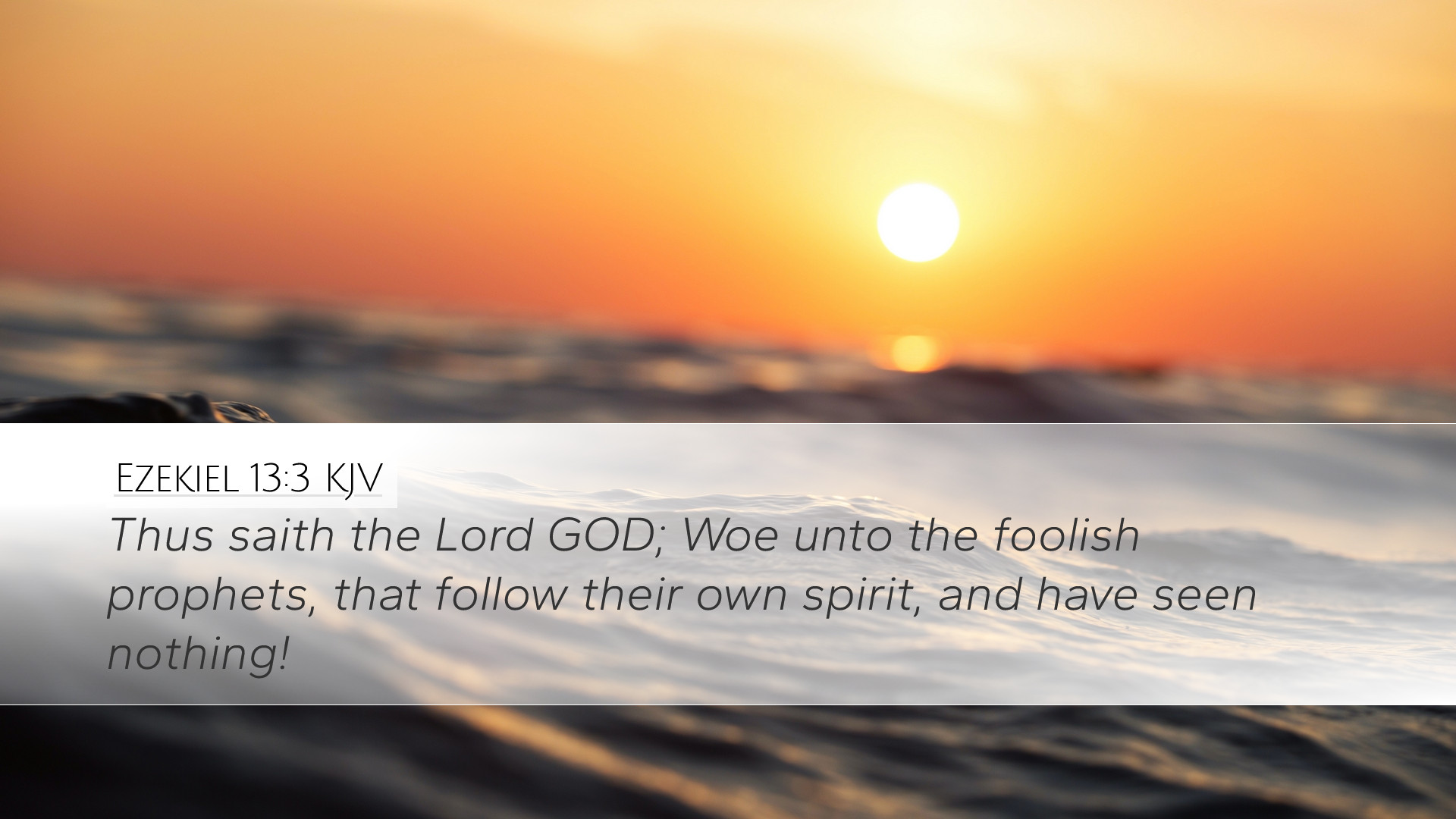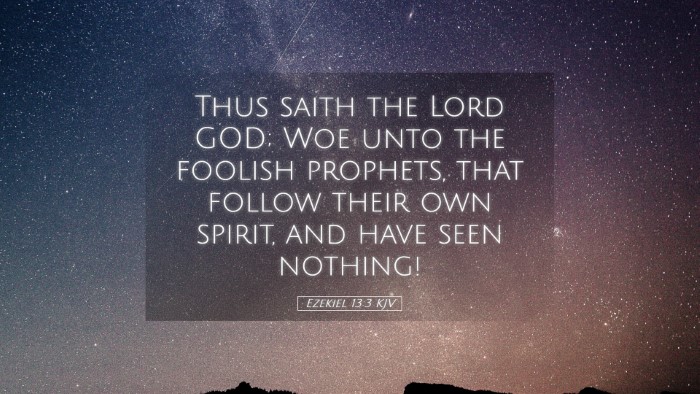Bible Commentary on Ezekiel 13:3
Ezekiel 13:3 (ESV): "Thus says the Lord GOD: Woe to the foolish prophets who follow their own spirit, and have seen nothing!"
This verse serves as a dire warning concerning false prophets. The oracles delivered by Ezekiel highlight the critical importance of prophetic accuracy and divine inspiration in ministry. Below, we will summarize insights from various public domain commentaries, including those of Matthew Henry, Albert Barnes, and Adam Clarke, to elucidate the rich theological implications of this verse.
Understanding the Context
Historical Background: Ezekiel's prophecies were given during the Babylonian exile, a time of immense distress for the Israelites. False prophets emerged during this period, offering misleading comfort and false hopes to the people, which Ezekiel vehemently opposes.
The Role of Prophets: True prophets are seen as messengers of God, empowered by the Holy Spirit to convey divine truths. In stark contrast, the "foolish prophets" of this verse are described as those who devise their teachings based solely on personal insight rather than divine revelation.
Key Themes and Insights
-
The Danger of False Prophecy:
Matthew Henry highlights the spiritual peril posed by misleading prophetic voices, asserting that they not only compromise their own integrity but also lead the community astray. This admonition extends universally across time and context, asserting that the consequences of following falsehood can lead to spiritual ruin and societal decay.
-
Autonomy in Prophetic Claim:
Albert Barnes emphasizes the phrase "who follow their own spirit". He suggests that such prophets act out of their own imagination rather than divine guidance, showcasing the grave responsibility of prophetic ministry.
-
The Nature of Vision and Revelation:
Adam Clarke comments on the term "have seen nothing," interpreting this as a criticism of the prophets' lack of true spiritual vision and understanding. True prophets must be grounded in a vision from God, which gives life and direction to their messages.
Theological Implications
The verse underscores several vital theological principles:
-
The Sovereignty of God:
By proclaiming "Thus says the Lord GOD," Ezekiel asserts the ultimate authority and sovereignty of God over human affairs, particularly in matters of spiritual guidance. This reinforces the notion that true prophets operate under divine command and discernment.
-
Spiritual Discernment:
It highlights the need for spiritual discernment among God’s people. The faithful are called to seek true prophets, distancing themselves from those who speak from a self-made authority.
-
Accountability in Ministry:
There is a strong implication of accountability in the ministry as illustrated by the judgment called "woe." Prophets, as spiritual leaders, bear a significant weight; their messages hold the power to uplift or deceive God's people.
Application for Today
In contemporary times, the message of this verse resonates with significant relevance:
-
Discernment in Leadership:
Church leaders and congregants alike must cultivate discernment and a strong grounding in the Word of God to guard against the allure of modern-day "foolish prophets" who prioritize personal charisma over scriptural fidelity.
-
Prayer for Guidance:
Seek the Holy Spirit’s guidance in assessing teachings and prophecies within the church setting. A prayerful heart tuned to God’s voice is essential in preserving the authenticity and truth of God’s message.
-
Emphasis on Scripture:
Encourage a return to the pure teachings of Scripture, ensuring that all guidance, prophetic or otherwise, aligns with Biblical truths and the Gospel of Jesus Christ.
Conclusion
In conclusion, Ezekiel 13:3 encapsulates a timeless truth about the significance of prophetic ministry rooted in divine revelation. As pastors, students, theologians, and Bible scholars, it is incumbent upon us to heed the warning against false prophecies, seeking a deeper relationship with God that informs our understanding and application of His Word. We must strive diligently to discern truth from falsehood, ensuring our own spiritual integrity and that of our communities as we look to lead others in the ways of the Lord.


